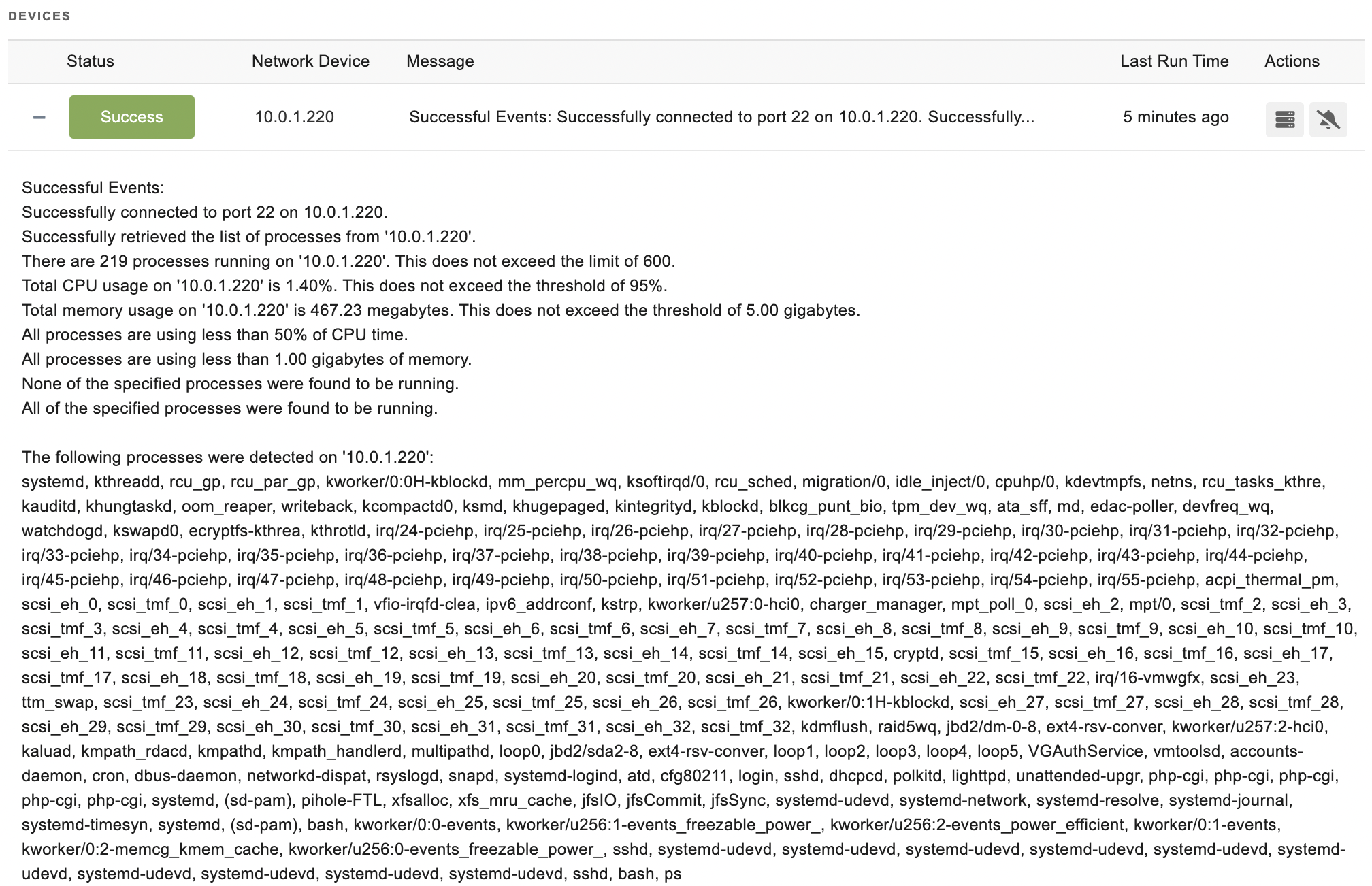Linux/SSH Process Event Monitor Reference Guide
Linux/SSH Process Event Monitor
Monitors processes running on your Linux systems.
Overview
The Linux/SSH Process Event Monitor lets you keep track of processes running on your Linux-based systems. It can perform overall checks for total CPU and memory usage or it can focus on important processes that you select and report only on those. It also has options to warn if specified processes are present or missing and can include a list of all detected processes in alerts and notifications.
Use Cases
- Keeping tabs on how many processes are running
- Making sure specific processes aren't taking up too much CPU
Monitoring Options
This event monitor provides the following options:
Alert with [Info/Warning/Error/Critical] if the device cannot be contacted
Use this option to control whether or not you will be notified if the event monitor is unable to establish an SSH connection.
Alert if more than a specified number of processes are running
This option lets you select thresholds based on the total number of processes that are running and get alerts when any of the thresholds have been exceeded.
Alert if total CPU usage is greater than a specified percent
This option calculates the total CPU usage of all processes and alerts based on the thresholds that you choose.
Alert if [any process|this process] is using more than a specified percent of CPU time
Use this option to get alerts about processes that are using the most CPU time. Or you can select to watch any individual process that you want to monitor.
Alert if total memory usage is more than a specified value
This option measures the total amount of memory used by all processes and alerts you based on the thresholds that you choose.
Alert if [any process|this process] is using more than a specified amount of memory
Use this option to get alerts about the processes that are using the most memory. Or you can select to watch any individual process and alert about its memory usage.
Alert with [Info/Warning/Error/Critical] if specified processes are found to be running
Use this option to be notified if selected processes are running.
Process Names
Enter the names of the processes that the event monitor will look for. To get the exact name, use the option below to include a list of running processes in all notifications. To specify multiple processes, separate them with commas.
Only warn if more than [count] instances of a process are found
In some cases, it is normal to have a few instances of a specific process running but having too many of them can indicate a problem. Use this option to only get alerts if there are more than a certain number of instances of the same process running.
Alert with [Info/Warning/Error/Critical] if specified processes are not found to be running
If you have critical processes that must be running all the time, use this option to get alerts if they are not found. To specify multiple processes, separate them with commas.
Include a list of running processes in all notifications
When this option is selected the event monitor will include a list of all detected processes in each alert and notification. It's a great way view and select the exact process names to be used in other settings for the event monitor.
Connect on port number
The default port for SSH connections is 22 but if your servers are using a non-standard port you can specify it here.
Authentication and Security
The account used for authentication must have interactive login rights via SSH. Additionally, the account must have permission to run the following:
- free -b
- sysctl -a
- cat /proc/cpuinfo
- ps -eo
Protocols
Data Points
This event monitor generates the following data points:
| Data Point | Description |
|---|---|
| Process Count | The number of processes detected. |
| CPU Usage (Total) | The total time the CPU is in use. |
| Memory Usage (Total) | The amount of memory used in total. |
Tutorial
To view the tutorial for this event monitor, click here.
Sample Output

Comments
Add a comment